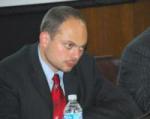
Last week, the White House and the Kremlin simultaneously announced that President Trump and Russian President Vladimir Putin will hold their first official bilateral summit in Helsinki on July 16. “The two leaders will discuss relations between the United States and Russia and a range of national security issues,” reads the U.S. statement.
For Putin, who has been in power for nearly two decades, this will be his inaugural summit with a fourth different U.S. president. By curious coincidence, all of the previous meetings took place during the the summer. In June 2000, the new Russian leader hosted President Bill Clinton at the Kremlin. During the two days of talks, as well as a joint news conference dominated by arms control and missile defense, the two leaders were polite but reserved; a notable change from the personal warmth that had characterized the relationship between Clinton and Putin’s predecessor Boris Yeltsin. “President Yeltsin led Russia to freedom. Under President Putin, Russia has the chance to build prosperity and strength, while safeguarding that freedom and the rule of law,” Clinton said standing by Putin’s side, later adding, “it’s a big challenge. I think he is fully capable of doing it.”
https://www.washingtonpost.com...
In private, Clinton was not so sure. After concluding his talks at the Kremlin, he went to see Yeltsin, who was settling into retirement on the outskirts of Moscow. “Boris, you’ve got democracy in your heart . . . You’ve got the fire in your belly of a real democrat and a real reformer. I’m not sure Putin has that,” Clinton told Yeltsin over tea in his residence. Clinton’s concerns were motivated by a deal Putin had made with the Communists in Parliament, as well as a police raid on the offices of Media-Most, Russia’s largest independent media group.
Advertisement / Reklaam
Advertisement / Reklaam
By the time of the next U.S.-Russia summit in June 2001, fears about Putin’s authoritarian tendencies had turned into certainty. The appointmentof Kremlin envoys to the country’s different regions signaled a shift from federalism to a more centralized government. The replacement of the elected upper house of Parliament with an appointed one curbed the independence of the legislative branch. And Russia’s largest private television network, NTV, had been taken over by a state-controlled company during a predawn raid on its studios. The worst abuses of Putin’s regime were still to come, but the trend was unmistakable. In a telling move for a country where symbols matter, Putin reinstated the music of the Soviet-era national anthem personally picked by Joseph Stalin.None of this seemed to concern the new U.S. president, George W. Bush, as he met with Putin in Ljubljana, Slovenia. “I looked the man in the eye. I found him to be very straightforward and trustworthy,” Bush said at their joint news conference. “I was able to get a sense of his soul. . . . We share a lot of values. I view him as a remarkable leader. I believe his leadership will serve Russia well.”
There may have been few areas of continuity between Bush and his successor in the White House, but they both started off with similar attitudes toward Putin. At his first meeting with Putin outside Moscow in July 2009, President Barack Obama — who began his presidency by calling for a “reset” with the Kremlin — praised him for “the extraordinary work that [he has] done on behalf of the Russian people.” Even without that praise, the mere fact of the meeting was telling. At the time, Putin was Russia’s prime minister, having temporarily ceded the presidency to his sidekick Dmitry Medvedev. (This was the simplest way to bypass a constitutional limit of two consecutive presidential terms.) Russia’s constitution gives the prime minister no role in foreign or defense matters, and Russian opposition leaders had urged the U.S. government not to grant Putin a status to which he was not entitled. The White House decided otherwise.
Advertisement / Reklaam
Advertisement / Reklaam
It was not as though there were no warnings. As early as February 2000, before Putin formally became president of Russia, U.S. presidential candidate Sen. John McCain (R-Ariz.), during a debate against Bush, remarked that he was “very concerned about Mr. Putin” and “afraid Mr. Putin might be one of those who wants to make the trains run on time.” It was a reference to the Benito Mussolini regime in Italy, and it would provean apt comparison. Mitt Romney, Obama’s opponent in 2012, referred to the Kremlin as “our number one geopolitical foe.” McCain and Romney both lost, while the winners chose not to hear the warnings.As Trump prepares to travel to Helsinki, he would be wise to remember how his predecessors’ attempts to seek accommodation with Putin ended. For an officer of the Soviet KGB (they like to say the term “former” never applies), an interlocutor’s willingness to compromise is a sign of weakness, never an invitation to reciprocate. Both Bush and Obama ended with very different attitudes toward Putin from the ones they started with; both ultimately came to the realization that there cannot be genuine partnership, let alone a convergence of interests, between a democracy and a corrupt authoritarian regime.
As another U.S. president prepares to extend a hand of cooperation to Vladimir Putin, there is little doubt about the likely outcome. The only question is whether valuable time can be saved by heeding past lessons.
























